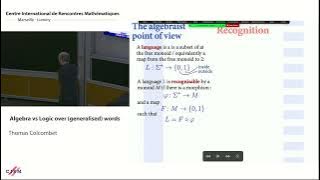Second-order logic
In logic and mathematics, second-order logic is an extension of first-order logic, which itself is an extension of propositional logic. Second-order logic is in turn extended by higher-order logic and type theory. First-order logic quantifies only variables that range over individuals (elements of the domain of discourse); second-order logic, in addition, also quantifies over relations. For example, the second-order sentence says that for every formula P, and every individual x, either Px is true or not(Px) is true (this is the law of excluded middle). Second-order logic also includes quantification over sets, functions, and other variables (see section ). Both first-order and second-order logic use the idea of a domain of discourse (often called simply the "domain" or the "universe"). The domain is a set over which individual elements may be quantified. (Wikipedia).




















